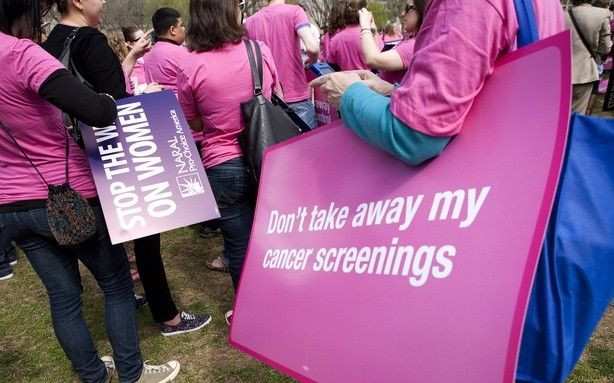Komen Memo Told Employees to Deny Political Motivation Behind Planned Parenthood Cut: Report

Susan G. Komen for the Cure may have purposely adopted a new policy prohibiting it from funding grants to groups under a formal investigation in order to suspend its grant partnership with Planned Parenthood, according to a new report from The Atlantic that cites three sources with direct knowledge of the issue.
Komen, the world's leading breast cancer research advocacy group, reportedly adopted the policy at the behest of its senior vice president for public policy, Karen Handel, who joined the foundation last April after a failed gubernatorial run in Georgia. Handel, as has been widely reported, adamantly opposes abortion and has publicly stated that she does not support the mission of Planned Parenthood.
During their five-year partnership, Planned Parenthood has used Komen's donations to fund breast-screening exams for low-income women. The grants reportedly funded 170,000 clinical breast screenings last year, as well as more than 6,400 mammogram referrals.
The decision reportedly met with some resistance among Komen officials. Mollie Williams, the agency's top public health official, reportedly resigned in protest immediately after Komen's board of directors announced it would cut off Planned Parenthood, according to John Hammarley, Komen's former senior communications adviser. He said Komen officials began discussing methods to distance the charity from Planned Parenthood about a year ago and analyzed the potential public relations impact.
The Komen board of directors are very politically savvy ... and I think over time they thought if they gave in to the very aggressive propaganda machine of the anti-abortion groups, that the issue would go away. It seemed very short-sighted to me, he told the source.
Meanwhile, a source directly involved with Komen's management activities told The Atlantic the foundation saw U.S. Rep. Cliff Stearns' congressional investigation into Planned Parenthood as an opportunity to suspend funding.
In a statement, Williams told the source she could not respond to questions about the Planned Parenthood controversy, although she emphasized that she believes it would be a mistake for any organization to bow to political pressure and compromise its mission.
The Atlantic also obtained an internal Komen memorandum directing employees to deny the decision was politically motivated. A portion of the memo, written as a Q&A, reads as follows:
Q(uestion) 7: Is Komen giving into pressure from the Catholic Church/anti-abortion groups/the political right in making this change?
A(nswer) 7: Komen's decision to fund ANY grant is based on our mission priorities, a thorough community assessment, and strict eligibility and performance standards. Our granting criteria reflect our dedication to our mission and our consistent effort to invest our donors' dollars responsibly in support of our efforts to end breast cancer.
Q8: Planned Parenthood provides health services in many of the nation's poorest communities. How does your new policy align with your mission of serving women who lack resources to pay for important breast health services?
A8: Susan G. Komen is deeply committed to providing breast health services to women throughout the U.S. It is our belief that where a woman lives should not determine whether she lives. Komen provided funds for 700,000 breast screenings last year alone, and provided financial and social support to another 100,000 women, as part of our $93 million investment in education, public health outreach and service to vulnerable women last year alone. That work will continue. We believe these new standards will further enhance the integrity of our granting process and strengthen our overall community health program.
In a video posted to YouTube on Wednesday evening, Komen founder and CEO Nancy Brinker insisted the Komen foundation's decision has been mischaracterized and said the organization will never bow down to political pressure.
© Copyright IBTimes 2025. All rights reserved.





















